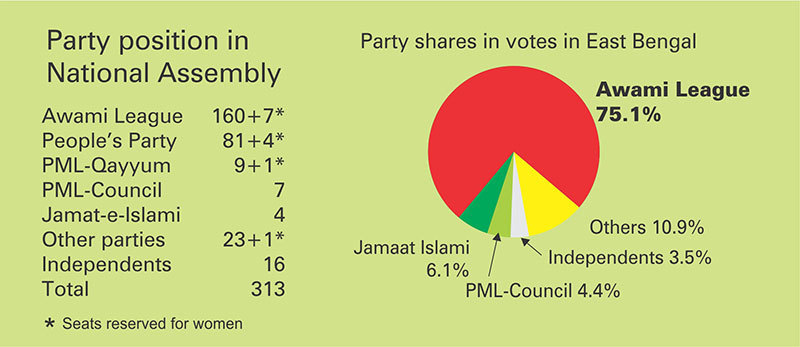Revisiting 1971: What if they elected traitors?

Most Pakistanis feel uneasy coming to terms with the reality that is Bangladesh. They hide themselves behind a shoddy narrative of 1971, and neatly categorise the whole thing as a 'conspiracy'. It might well have been one. But who conspired against whom and when? What were the Bengalis up to? And how did they reach breaking point?
This article is the Part 3 of a four-part series that looks back at the events of 1971 in Pakistan from the perspective of the development of democracy in this country. Read Part 1 and Part 2.
Pakistan started counting traitors before it actually became a nation. There has hardly been a time since its birth that it did not find itself on a crossroad, crying foul at the top of its voice.
Those in power had very strong ideas about what kind of state and government they wanted and demanded an electoral democracy only to legitimise their plans.
Poor democracy, however, lacked the capacity to oblige, despite all the sincere efforts made by its administrators. They wanted it to come back again and again to square-one, but democracy would insist on producing more numbers than required. It can't be by coincidence that all of Pakistan's traitor-designates or traitor-suspects were voted feverishly by the people.
Also read: Bangladesh sentences another top JI leader to death
Let me illustrate my point with an example:
Prime Minister Liaquat Ali Khan moved the Objectives Resolution in the Constituent Assembly of Pakistan on March 7, 1949. The Assembly gathered in Karachi for its fifth session in its 20-months life. It was the first day of proceedings, starting at 4 o'clock in the afternoon when Liaquat Ali Khan moved the resolution and made a lengthy speech. Immediately afterwards, opposition leaders – Hindus from East Bengal – rose and raised many objections apprehending that the Prime Minister wanted to bulldoze through the Resolution.
Quoting from the debate (official document):
Mr Sris Chandra Chattopadhyaya: ... We need time to study it, in consultation with our friends in East Bengal and for the sake of clarification. In fact when we left East Bengal this time we had no idea that such a Resolution was to be brought forward. There was no indication of it in the Agenda papers circulated. The budgetary session is almost at an end. The attendance in the House is very thin. Many members of my province - East Bengal - the Prime Minister (of Bengal) who might very well give us advice and guidance have left already. I presume they had no idea about it. There are some Members who did not attend the session at all. Surely they would have attended this meeting to take part in the discussion of such a Resolution if proper notice was given to them. Practically no notice was given to them. I, therefore, venture to suggest that the consideration of an important matter like this should be postponed and the Resolution be circulated for eliciting public opinion, till the next session or a special session may be convened for this purpose ...
Read on: Objectives Resolution: the root of religious orthodoxy
The Honourable Mr Liaqat Ali Khan: Sir, I am afraid there is a lot of contradiction in the arguments that have been advanced by the Honourable Members who have moved the motion for circulation of this Resolution. One of the chief arguments that has been advanced is that the House is very thin as most of the members have left and are not here and that they have not had enough time. As far as the Members of my Honourable friend's party are concerned, every single of them is present in the House except one, who unfortunately is not well but is present in Karachi. So far as absence of Members is concerned I do not think that this is really very valid ground.
Mr Sris Chandra Chattopadhyaya: There is no party of mine. I will deal with every one.
The Honourable Mr Liaqat Ali Khan: When I said 'party' I meant the non-Muslim Members of the House, because after all if anything can be said about this Resolution, if any objection can be raised, it can only be from the non-Muslim Members of this House, and I said just now, every one of them is present here ...
So the prime minister did not consider it important for the Muslim members to be present in the Assembly at the time when he tabled the most important constitutional instrument of our history. In fact, he did not want them to forward any arguments, or, God forbid, make any objection. They were expected to nod their heads like brides do, from underneath the pile of exotic fabric that is piled up on them, when approached by the nikah khwan. No good Muslim should even think about opposing anything (including rule) being done in the name of Islam.
But good Muslims were in short supply in East Bengal as they kept demanding their rights. They wanted a constitution drafted by an assembly that is elected directly by the people. They wanted Pakistan to be a federation that treats all of its units with equality and justice. They wanted maximum provincial autonomy and effective safeguards against economic exploitation. They demanded respect for their language and culture.
All of this was not acceptable to what we have known as our 'establishment'. But none of it could be suppressed because whenever democracy was allowed to prevail, people enthusiastically supported all of the Bengali demands. So, for around a quarter of a century, they tried to remodel democracy to suit them.
See: A leaf from history: Advice that went down the drain
Nothing worked. By 1969, the civil-military establishment came to this depressing conclusion that they have to accept at least some of the Bengali demands.
So, general elections were announced. The principle of one-person-one-vote was accepted and people were to directly elect a Constituent Assembly (as opposed to the indirect elections introduced by General Ayub). East Bengal was given representation in the assembly proportionate to its population. So it had 162 of the 300 general seats and seven of 13 reserved for women. Polling was held in December 1970, and the results were as following:

Awami League led by Sheikh Mujibur Rehman swept all the East Bengal seats except two. It definitely was the strongest possible verdict. It gave the Awami League agenda legitimacy of the highest order. Its leaders stood victorious and vindicated. They had passed the toughest of the tests with flying colors.
Explore: 1970 polls: When election results created a storm
The elected Assembly was supposed to draft a constitution for the country within 120 days of its first meeting. General Yahya announced to hold the first meeting of the Assembly on March 3, 1971 and Awami League's parliamentary committee announced the salient features of the constitution on February 27.
Since the party had simple majority in the House, there was no way it could be stopped from adopting the basic principles in its inaugural meeting. This would have effectively ended the rule of the Pakistani establishment over at least East Bengal, if not the entire country.
Yahya postponed the inaugural session and engaged in talks with Mujib and Bhutto, which remained fruitless. The General soon admitted his defeat on the democratic front and challenged Bengalis on the other.
Pakistan army declared war on East Pakistan on the night of March 25.
Explore: 1971 war: A textbook case
They left behind tremendous evidence of their hatred for free-thinking people, who were fearless while giving verdicts as well. Bengalis swear that these people were in millions. I will share only one with you here.
Within days, the military campaign changed into a full-scale civil war as Bengalis were ready for the worst. The assembly elected in December 1970 did not meet. Pakistan banned the Awami League and disqualified 76 of its 160 elected members for being traitors. So, the Awami League was cut down to size with its strength reduced from the commanding 167 to just 84 in the House of 313. That was at par with PPP, which had 81 in Punjab and Sindh. A divided and hung parliament is always in 'the best national interest'.
The General was, however, living in a fool's paradise. He amended his LFO in September 1971 to facilitate the Election Commission to organise by-elections on these 'vacated seats' of East Bengal. By that time, it was simply out of question for the government of Pakistan to perform in Bengal.
Religious parties saw an opportunity in this absurd and bleak situation. Six of them, led by Jamaat Islami, met and decided to field joint candidates on these seats knowing that their nominees will return uncontested as no one else considered the exercise legitimate. So on November 11, the EC found only one candidate each on 63 of these seats. All of them thus, were returned uncontested. This is how each party fared on these seats:
Jamaat Islami — 15
Pakistan Democratic Party — 12
Pakistan Muslim League — Council 7
Nizam-e-Islam — 6
Pakistan Muslim League — Convention 6
Pakistan Muslim League — Qayyum 5
Pakistan People's Party — 5
PPP initially flayed the by-elections but later found the loot sale too tempting and joined the fray. 63 seats were decided and the EC announced to hold polls on the rest of the 15 from December 7 to 20, 1971. Curtains fell on this theatre of the absurd on December 3, as war broke out on the western front as well and the EC announced postponement of by-elections.
Explore: A leaf from history: When the war began
ZA Bhutto became the President and the Chief Martial Law Administrator on December 20, four days after the Pakistan Army surrendered in Dhaka. Bhutto nullified the by-elections on December 23, depriving Jamaat Islami of its biggest ever electoral triumph.
This article was first published on dawn.com on December 17, 2012.
Related:












































